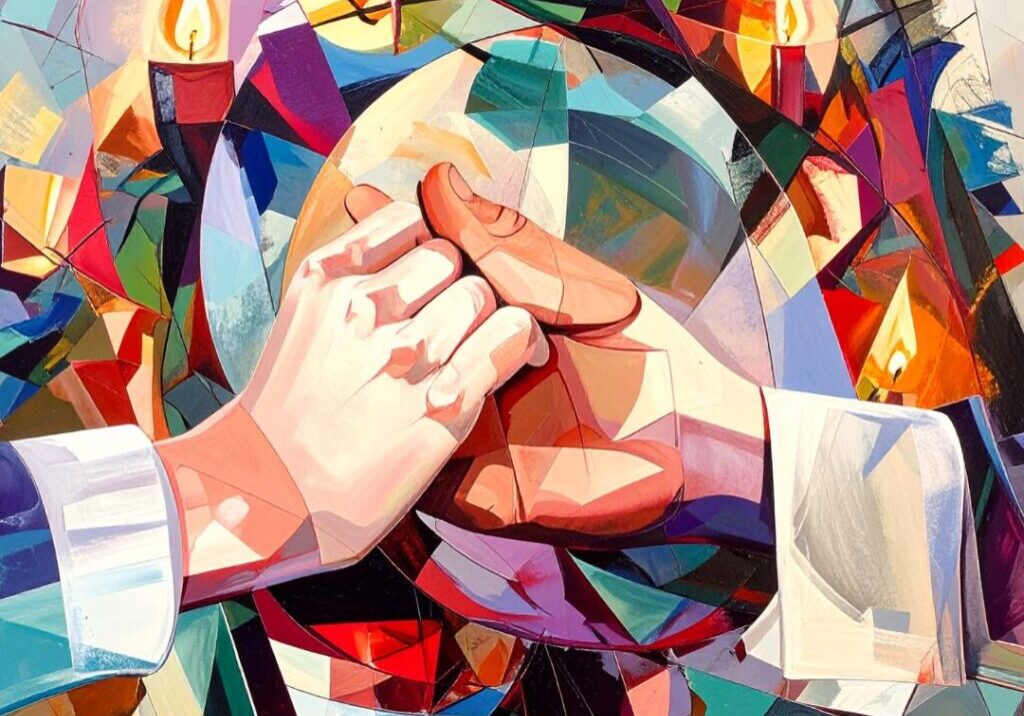Four Ways Of Understanding Love In A Fractured World
How we perceive and make meaning about reality determines how we think about how love can heal a fractured universe.
If we have only one way of knowing about love we are “onesided” as Carl Jung described and we contribute to the fracturing of our world. To fully understand the potential and power of love to connect our diverse parts in a Whole we need to understand love from multiple perspectives that together get us closer to reality and wisdom in the Universe.
To explore love from multiple perspectives I will use the Ways of Knowing model (Olson, 2014) I developed for my study of the integration of science and religion (Olson, 2009, 2017).
 When the four ways of knowing in the model interact, a closer approximation to the reality or truth of a phenomenon or issue emerges. The four ways of knowing are Insight, Authority, Empiricism, and Praxis.
When the four ways of knowing in the model interact, a closer approximation to the reality or truth of a phenomenon or issue emerges. The four ways of knowing are Insight, Authority, Empiricism, and Praxis.
Insight
As individuals we give meaning to our intuitions about love. Our insights are subjective, ineffable, and mysterious, often sourced by our dreams and active imagination. John Phillip Newell says that insights about love are attempts “to say the unsayable, endeavoring to express what is beyond definition by employing the even more inexplicable word God” (Newell, 2015, p 105). Religious mystics have insights about the One who is absolute love that is with us in suffering and lures us into a life of hope and promise.
Authority
What we know based on the intuitions of others is Authority. Both religious and secular sages have left us with their descriptions of their awakening and how to open our hearts to love. For example, Teilhard de Chardin argues that Love is a passionate force at the heart of the universe, a cosmic unitive principle. Love is the physical structure of the universe present from the Big Bang onward. Love draws together and unites; in uniting, it differentiates. Love-energy is intrinsically relational and undergirds relationality in the universe (Delio, 2015, p. 141).
This sweeping philosophy of love proposes that Love is THE container in the universe in which the differences created by love are also unified into One. As the energy of evolution, love-energy is the self-organizing force in creation that continues to create more complexity and even greater awareness of the wholeness of being. My colleague Glenda Eoyang and I have identified the three conditions necessary for self-organization to occur: (1) a container(s) able to hold (2) significant differences together until (3) transformative exchanges emerge (Olson & Eoyang, 2001). In Teilhard’s formulation, Love-energy is all three conditions simultaneously. Love is the container that creates both differences and transformative exchanges that create the unified Whole, which he identifies with God.
Empiricism
What others have discovered to be empirically verified about the universe and how our being is woven into the matter of the universe is empiricism. Not limited to scientific discoveries, this is also the common understanding of nature people have determined from their five senses.
Neuroscience, for example, explores the inner workings of our minds and how we make choices and rewire our own brains through these choices. Chemists are also exploring how the emotions of love promote physical wellbeing and sickness. Recent discoveries in quantum biology suggest that the quantum properties of entanglement, superposition, and tunneling are essential to how the phenomenon of love is so powerful and pervasive in our lives.
Praxis
Praxis is our way of knowing when we as individuals use our five senses to create meaning from our physical experience. When we have an experience of loving we are training our brains to find an alternative to the automatic fight or flight responses that we have seen through the ages. Tomaino says: “Each time you make a conscious choice for love, compassion, and understanding you build a new automatic neurological reaction that will be stronger next time” (Tomaino. 2016).
Teilhard says: “If there was no internal propensity to unite, even … at a rudimentary level – indeed in the molecule itself – it would be physically impossible for love to appear higher up in a hominized form” (Delio, 2015, pp.141-142)
We experience love from those who are faithful to us and whom we long for in the midst of our brokenness. Every physical manifestation in the Universe is a potential expression of love that we experience. John Phillip Newell says:
The rising sun is a means to love, as is the whiteness of the moon at night. Every life form, the shape of the weeping willow by the distant pond, the song of the robin in the hedgerow, the light in the eyes of every creature – all these are means to love. I am a means to love, as are you, your children, and your nation. Do we know that? Do we know that this is our sacred role in the world?
Interaction of the Four Ways of Knowing
Each of the four ways of knowing can be placed in tension as polarities with each other to either reinforce or correct the other. For example, when Empiricism is enhanced by Insight, Authority, and Praxis, new perspectives emerge.
Insight >>> Empiricism: Our imagination interacts with the creative processes within nature and enhances the expression of nature’s reality, e.g. use of the term “Big Bang”.
Authority >>> Empiricism: Teilhard’s philosophy of love puts the cosmos in relation to the absolute power of love which is God. “Science can purify religion from idolatry, the late Pope John Paul II wrote, and religion can purify science from false absolutes” (Delio, 2016).
Praxis >>> Empiricism: Our senses and engagement with the material world leads us to look for evidence of how everything is connected in a world of love.
Conclusion
When we consider how love can be known through our adoration of prophets and sages (Authority), with our ineffable awareness of the mystery of life (Insight), in the awesome discoveries of the galaxies and the quantum world (Empiricism), and in our personal encounters with people and animals who love us and whom we love (Praxis), we have many choices. The imperative that arises for me is to love in my day-to-day relationships and as a call to work for social justice. John Phillip Newell (2015, pp. 115-119) says there is no distinction between love and justice. “We are made as a means to love. It is God-given. The question is whether we will live what we truly are – love.”
REFERENCES
Delio, Ilia (2015). Making All Things New: Catholicity, Cosmology, Consciousness. Maryknoll, New York: Orbis Books.
_______(2016). “Love at the Heart of the Cosmos”. The Omega Center. https://www.christogenesis.org/love-at-the-heart-of-the-cosmos/
Newell, John Phillip (2015). The Rebirthing of God: Christianity’s Struggle for New Beginnings. Woodstock, Vermont. Skylight Paths Publishing
Olson, Edwin E. & Glenda H. Eoyang (2001). Facilitating Organization Change: Lessons from Complexity Science. San Francisco: Jossey-Bass.
Olson, Edwin E. (2009). Keep the Bathwater: Emergence of the Sacred in Science and Religion. Estero, FL: Island Sound Press.
___________ (2014) Finding Reality: Four Ways of Knowing. Bloomington, Indiana: Archway Publishing.
___________ (2017). Life, Mind, and Spirit on the Edge (tentative title)
Tomaino, Charlotte A. (2016). “Can You Choose a Consciousness of Love to Live From?” The Omega Center. https://www.christogenesis.org/can-you-choose-a-consciousness-of-love-to-live-from/er integrate this blog and this month’s theme.
 View print-friendly version
View print-friendly version
1 Comment
Related Posts

Rewiring Our Lives Together, the Franciscan Way
The Season of Incarnation We are in the season of Incarnation—God becoming flesh. It is a beautiful time of the year that brings out the best of humanity, even in…


Thanks for this Edwin. I would appreciate it if you could advise of any seminal works/thinkers that you would recommend, particularly those that explore an integration of theology, psychology and spirituality.
Many thanks,
Luke